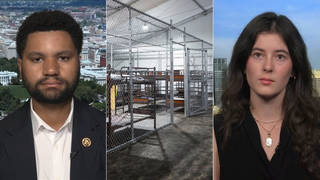
Topics
Guests
- Charles Levinsonreporter for Reuters. He co-wrote the special report, “Pentagon thwarts Obama’s effort to close Guantanamo.”
In the nearly seven years since President Obama ordered Guantánamo’s closure, Republicans have blocked him at every turn. Now a new report sheds light on another obstacle in Obama’s way: his own Pentagon. According to Reuters, military brass have imposed bureaucratic hurdles to keep prisoners locked up and prevent foreign governments from taking them in. Scores of prisoners cleared for release have remained imprisoned for years as a result. We are joined by two guests: Charles Levinson, the Reuters reporter who broke this story, and Omar Farah, the lawyer for a Yemeni prisoner who was cleared for release five years ago but remains behind bars due to Pentagon interference.
Transcript
JUAN GONZÁLEZ: Next month will mark seven years since President Obama’s inauguration. That also means it will be seven years since the president ordered the closure of the Guantánamo Bay military prison in one of his first executive actions. We all know that has not panned out, with 107 prisoners still there. It’s also well known that congressional Republicans are the biggest obstacle, passing a series of measures blocking Obama’s effort.
But now a new report sheds light on another hurdle that’s received far less attention. According to Reuters, the Pentagon has thwarted the Obama administration’s efforts to close Guantánamo by imposing bureaucratic hurdles to delay or derail prisoners’ release. A former official compared negotiating prisoner releases with the military brass to “punching a pillow.” Pentagon delays forced four Afghans to spend an additional four years in Guantánamo despite their approval for transfer. The Pentagon has even meddled with the effort to enlist other countries in accepting freed prisoners. It’s refused to provide foreign governments with photographs and basic documentation necessary for the transfer process. And it’s barred foreign delegations from spending the night at Guantánamo and reduced their interview times with eligible prisoners, making the prisoners much harder to vet.
AMY GOODMAN: In one case, the Pentagon refused to release medical records for a hunger-striking Yemeni prisoner to a delegation from a country that was considering taking him. The prisoner, Tariq Ba Odah, remains at Guantánamo today—five years after he was cleared for release.
The obstruction appears reserved for President Obama. While President Bush transferred 532 prisoners out of Guantánamo and faced no political opposition, Obama has only been able to transfer 131 during his two terms. Obama has said he’ll push Congress on closure during his final year in the White House. But Reuters notes, with the added obstacles from the Pentagon, it’s increasingly doubtful that Obama will be able to fulfill his pledge.
For more, we’re joined by two guests. Charles Levinson is a Reuters correspondent who co-wrote this special report on Pentagon obstruction. And Omar Farah is with us, an attorney with the Center for Constitutional Rights. He represents Tariq Ba Odah, the Yemeni prisoner who remains locked up at Guantánamo because of the Pentagon’s interference.
We’re going to go first to Charles Levinson in Reno, Nevada. Can you talk about the scope of what you discovered? I mean, this is President Obama’s Pentagon.
CHARLES LEVINSON: Right, yeah. Basically, there is a sort of a deep institutional resistance in the military, in the Pentagon, against closing Guantánamo among a lot of rank-and-file, mid-level and more senior officers. And they’ve been able to use their sort of bureaucratic and administrative control over the Guantánamo Bay detention center to make it difficult to accomplish a lot of the things that need to be done in order to close the prison, such as facilitating visits of foreign delegations from countries who the United States, the Obama administration, is asking to take prisoners that they want to transfer out of the prison.
JUAN GONZÁLEZ: Well, what about some of those—
CHARLES LEVINSON: In the example of Tariq Ba Odah, for example, a third country that the U.S. had asked to take Ba Odah wanted to see the prisoner’s full medical file. This is a prisoner who’s been on hunger strike for seven years. His weight has dropped from 148 pounds to, I think, 60-something. He obviously needs—is going to need a lot of acute medical care by any country that takes him in, and they wanted to review his full medical file. And the Pentagon said—wouldn’t turn it over and still has not turned over that full medical file, instead just handing in a brief summary. The official reason the Pentagon has given for this is patient privacy concerns. But Mr. Ba Odah’s lawyer has waived those concerns. And I think a lot inside the administration believe that such concerns are really just a pretext for making it difficult to transfer Ba Odah, who I think many inside the military view as sort of still in the fight, since he has been on this hunger strike for seven years.
JUAN GONZÁLEZ: But, Charles Levinson, on these other limitations, for instance, this issue of not allowing foreign delegations to sleep over in Guantánamo, when everyone knows what a remote place, how difficult it is to get to Guantánamo, what about this limitation? Why do they—how do they explain that?
CHARLES LEVINSON: Right, this one is one that has particularly rankled certain U.S. officials who are trying to work to close the prison. Basically, these foreign delegations come to Guantánamo Bay, and they want to interview as many prisoners as they’re considering taking. It can be five, six, seven, eight prisoners, and they want to spend time getting to know these guys. Do we trust them? Do we believe that, you know, they really won’t be a threat to us if we bring them to our country? And they need to get to know these prisoners, and they’re encouraged to do so by the Obama administration. And that can take time. And so, if you—so, instead of coming down and spending a couple days, two, three days, interviewing these prisoners, recently—basically, since Obama began his new push to close this prison—the military has put new restrictions on spending the night at Guantánamo. And these are new. I mean, for a long time, foreign delegations were visiting this detention center and were allowed to spend the night. But more recently, they have been prevented from doing so.
And that has an impact not just on the ability of the Obama administration to facilitate these prisoner transfers and close the prison, but it also has a cost on taxpayers, because, at least in one case, the delegation in question had to commute each morning and afternoon from Miami—it’s a 90-minute flight, it’s taxpayer-funded—and that added tens of thousands of dollars in costs in airfare of military planes to facilitate this sort of very burdensome commute schedule.
AMY GOODMAN: Charles Levinson, in your article, you cite Pentagon spokesman Gary Ross, a U.S. Navy commander. He says, quote, “No foreign government or U.S. department has ever notified the Department of Defense that transfer negotiations collapsed due to a lack of information or access provided by the Department of Defense.” Can you respond to this?
CHARLES LEVINSON: Right. I mean, it’s not a surprise to see the Pentagon—and the White House, for that matter—at least publicly, putting on a public face of unity and cohesion and not sort of highlighting in their public statements the discord. But that statement certainly did not jive with our own reporting and many, many officials, current and present, that we spoke to, who voiced deep frustrations with the Pentagon and relayed to us that they had indeed conveyed those frustrations to military officials many, many, many times over the past several years.
JUAN GONZÁLEZ: And were you able to get, in your reporting, any sort of indication from the White House of its frustration with this policy? And why doesn’t the president just, as commander-in-chief, order that this stuff be done?
CHARLES LEVINSON: Right, and I think there has been a movement towards doing that. I know, to—I think, to us outsiders, who aren’t in the White House and in government, it seems as easy as a president just saying, “If this is what I want, this is the way it should be.” And the fact that it’s not that easy sometimes surprises us. I think, you know, part of the reason that former Defense Secretary Hagel was removed from office—I mean, there are several factors, but certainly one of them, according to many people, including Hagel himself—was the president’s frustration over the Pentagon’s slow progress transferring prisoners.
And more recently, Hagel’s successor, Ash Carter, was summoned to the White House just before Labor Day and was—you know, for a one-on-one sitdown with Obama, who, according to—people briefed on the meeting told us that Obama gave him sort of a very candid talk about the need to step up progress on this front. And I think, since that talk, there has been some progress. And there is a sense that things have gotten somewhat better, although there are still many frustrations. It is expected, for example, that next month, in January, there will be 17 prisoners transferred out. So, it does appear that as a Obama has sort of refocused and double down his attentions on this and really given this more attention, there has been some—you know, he has been able to make some headway in getting the Pentagon to do his bidding.
AMY GOODMAN: Maybe we can find out exactly what President Obama said to the secretary of defense when someone hacks into his private email account, right? It was just admitted that he was using that on his iPhone to talk with his staff.













Media Options